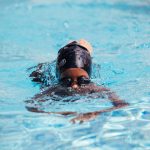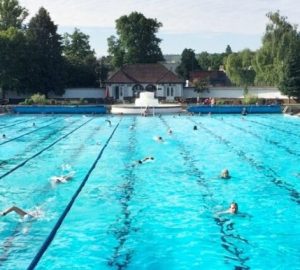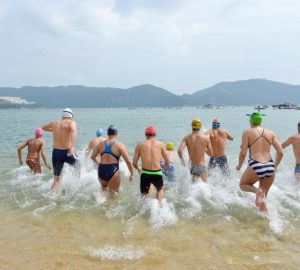Vicky Miller becomes tenth woman to cross the North Channel
The North Channel is one of the toughest crossings in the world, considered by many to be the ultimate marathon swimming challenge. One of the Oceans Seven swims, the channel is a 35km stretch of water between Ireland and Scotland.
According to the Irish Long Distance Swimming Association, it shouldn’t be compared to the English Channel: “Most swimmers should avoid this crossing, it is not for the many.” Cold, jellyfish and adverse weather conditions lower the chances of success. To put it in perspective, fewer than 30 people have successfully completed the swim.
On Friday 24 July at 5.15am, Vicky Miller set off from Northern Ireland with the aim of becoming the tenth woman to cross the North Channel. “I loved the first few hours, the water was really calm and serene, and I felt that I was swimming quickly and enjoyed that,” she says. Despite being acclimatised to the cold (her training included a six-hour qualifying swim in 13 degrees Celsius (or less) in Dover harbour in June), hypothermia was still a real risk on the crossing. “Water temperature ranged between 12.5-13.7 degrees, and I remember my teeth starting to chatter a little bit at times and I tried to avoid my crew seeing that. Afterwards, they told me that my hands were shaking as I reached for feeds though, so apparently it was quite obvious that I was fairly cold.”
But despite the cold, there was no way Vicky would let it stop her swim. “The cold was never a problem though; unpleasant, yes, something that would stop the swim, never! The sun did come out for a few hours which was great and this helped warm me up a bit too.”
But it is not just the cold that scuppers attempts at the North Channel. The crossing is infamous for its jellyfish: lion’s mane jellyfish, the largest species of jellyfish in the world, use their stinging tentacles to catch prey. Luckily that prey isn’t swimmers, but their stings are painful and they congregate in blooms – making them hard to avoid.
“The lion’s mane jellies started fairly deep so they were below me as I swam, but I did freak out when I started seeing them at the surface,” says Vicky. “I dodged them to start with but when there were big groups of them together, I just had to get on with it and swim through their long tentacles and get stung. The stings prickled but weren’t very painful, I think because I was so cold already.”
Many swimmers have much worse experiences with jellyfish. Although the stings were uncomfortable, Vicky believes her boots and braces approach to pain prevention worked. “I covered myself with two layers of LifeSystems ‘anti-jellyfish’ suncream,” she says. “I considered covering only my left arm and leg in it, but decided against the experimental approach and used loads all over! I only took an antihistamine tablet after I had been stung.” After the swim she applied a whole tube of steroid cream across her arms and legs to reduce inflammation. “I would use both the suncream and steroid cream in future, so in essence would recommend to others too.”
After the enjoyable start to the swim, the final four hours were pretty tough. “From about nine hours I started asking how far I had to go, and sensibly the crew wouldn’t say… However, after a bit, Brian [Meharg, the pilot] came out and said that I was definitely going to make it as the currents were on my side, so that was a big relief. However, from feed to feed (30 minute intervals), there was no discernible difference in how far away Scotland looked.”
By this point Vicky needed mental resolve as well as physical toughness to keep swimming. “I could see a lot of rocks I could swim to but I felt that my mind was playing tricks on me and working out which were the closest was beyond me!” Vicky knew the finish was in sight when her dad put on his wetsuit and Brian launched the rib to safely guide her to land.
“I felt an incredible wave of relief that the journey was almost at an end. Brian was pointing and waving like a traffic attendant guiding me towards the finish. I eventually swam up to some rocks just to the side of the harbour where a few people were enjoying a relaxed afternoon fishing, and finally the happiness hit as I pulled myself through the last 20 metres and climbed on the rock, hearing the horn blare its welcome finishing siren, with my dad just behind me.”






